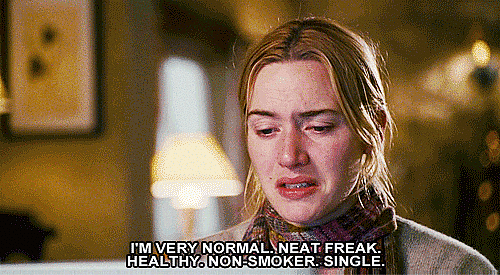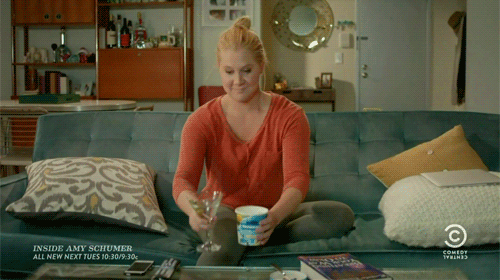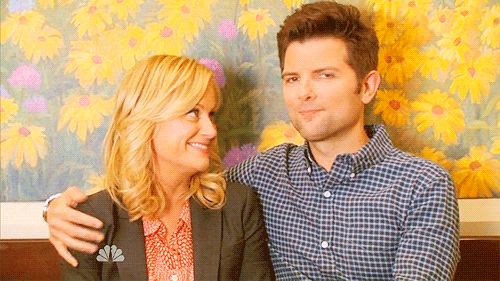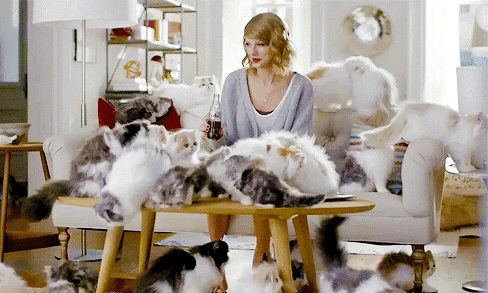New Zealand Study Confirms: You Can Be Single, Die Alone AND Still Be Happy
Me and my cats ARE making valid life choices, Mum.

Two days ago a young man on OKCupid asked me if I liked to wear men’s underwear. Now, I enjoy a little kink in my life, but being asked about my underwear preferences via an online dating service sure isn’t how I imagined adult courtship when I was a kid.
This one message initiated my exit from the illustrious world of online dating. After a slew of outrageous, creepy and hilarious pick-up lines had been thrust upon me, I deleted my profile.
As a self-diagnosed serial monogamist, I have a tendency to always be on the lookout for ‘the one’. So by the time I’d reached my 29th birthday and ‘the one’ hadn’t just stumbled into my life like a drunk man stumbles into a bar stool, I decided to go all You’ve Got Mail on this shit.
I never questioned my motives behind wanting to be in a relationship. It seemed perfectly reasonable to me that I would sift through a mountain of dick pics to find a person I could live a life with. This is all despite the fact that, as far as I can remember, the only things my long term relationships gave me was weight gain and inane fights over toilet paper. Actually, that’s not true. The last guy I was with for more than a month was so horribly monotonous, I developed a fantastic new skill – sleeping with my eyes open.
It seems easy, though, in this country to become disillusioned about long term relationships, what with Sydney nearly topping the list of Ashley Madison subscribers, divorce rates sitting at a mean 27.6 percent in 2011 and Emily from The Bachelor Australia revealing to our unabashed horror that all those fraught romantic entanglements were a lie.
It’s enough to say no to relationships altogether. But then, what other option do we have? To live with a thousand cats and die alone?
Well, yes, according to a recent study out of Auckland, which has been doing the internet rounds this past week, making all us single people feel warm and fuzzy inside.
–
Love And Marriage Go Together Like A Horse And Carriage; One Half Of Both Those Pairings Is Kinda Outdated
The University of Auckland study by social psychologists Yuthika U. Girme and Nickola C. Overall looks at people with “avoidance goals,” who attempt to avoid negative relationship experiences, versus people with “approach goals,” who choose to foster intimacy in their relationships, and finds that people with avoidance goals tend to be just as happy, if not happier, when free of a relationship fraught with potential for conflict.
Essentially, the study found that if you’re the kind of person who wants to avoid the bad and just get to the good, like skipping the first season of Parks and Recreation, then you might be better off staying single and cultivating your happiness elsewhere. By taking up gardening, for example, or joining a Rotary Club.
But if you can deal with the agony of watching Leslie Knope wander Pawnee aimlessly without Ben Wyatt, or all those general toilet paper conflicts that come with every relationship (I assume), then you may find your happiness in the tender bosom of a partner after all .
This study and its findings feel remarkably overdue, given that in Western societies, according to Girme, people are “single more often and for longer than ever before”.
As indicated by Girme and his colleagues, an overwhelming number of studies in the recent past have concluded that being in a relationship makes people, on average, happier. But they also argue that those results could be somewhat undermined by a study’s failure to engage in individual attitudes toward relationships.
I would further this to say that it could also be the traditional approach to defining what is and what isn’t a ‘relationship’ that compromises this statistic. Even in Girme’s study there is a distinct failure to recognise non-heteronormative relationships, such as polyamory or open relationships, and what could be the very significant impact they pose on potential happiness.
Past research has also indicated that marriage and long-term relationships do not necessarily increase happiness and well-being, but rather stave off a decline of happiness that comes when a single person reaches a certain age. There also exists the suggestion that happiness is a precursor to long-term relationships, rather than a consequence of those unions.
–
Moving Beyond The Standardised Fairytale Ending
That isn’t to say that the findings of this happiness study aren’t significant (or even if it were to say that, I’m not a psychologist, so…), but they are certainly not beyond our scrutiny.
What is important to note, however, is that we live in a society where — in pop culture at least — hetero-normative relationships are still regarded as the extra-large stuffed panda of life prizes, which is counter to current marital statistics, and perhaps detrimental to our perceptions of other kinds of relationships, including queer identifying relationships, familial relationships and friendships.
Hollywood has made entire films about the terrible lengths we will go to just to achieve this standardised fairytale ending, and instead of recoiling in horror at our naked reflections, we cheer ourselves on. “Yes!” we cry, “show up outside her house with a boom box blasting Peter Gabriel after she’s told you to leave her alone several times, that is a perfectly reasonable thing to do!”
Even with her much lauded, self-proclaimed ‘subversive’ romantic comedy Trainwreck, Amy Schumer woefully recycles the same rom-com tropes that have been around since Shakespeare, where a woman’s happiness is determined by her own marital status at the end of the play.
While not perfect, this study and the reception it’s gotten is perhaps indicative of the potential for Western society to step away from these archaic ‘Say Yes to the Dress’ attitudes, and embrace the idea that there are multiple ways to achieve happiness that fall well outside finding a life partner.
At the very least, it’s telling us that it’s not necessarily such a bad thing to be single, which is great news for me — and for my thousand cats.
–
Kara Eva Schlegl is a freelance writer with too much spare time and not enough episodes of Buffy to tide her over. She runs diversity driven Sydney comedy room Wolf Comedy and tweets from @kara_nation.







